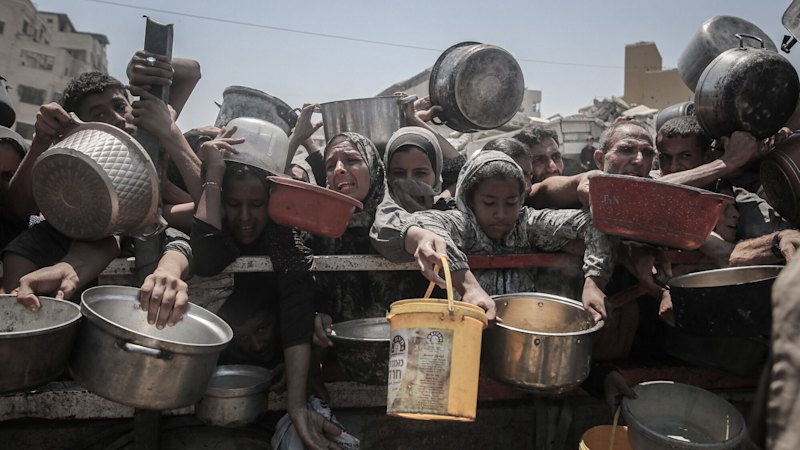
The three European leaders said the United Nations and non-government organisations should be allowed to distribute aid.
“We call on the Israeli government to immediately lift restrictions on the flow of aid and urgently allow the UN and humanitarian NGOs to carry out their work in order to take action against starvation,” they said.
“Israel must uphold its obligations under international humanitarian law.”
French President Emmanuel Macron, Germany’s Chancellor Friedrich Merz and British Prime Minister Keir Starmer during the NATO summit last month.Credit: Getty Images
The New York Times reported that Israeli officials on Friday said foreign nations would be allowed to parachute humanitarian aid to the starving population. Jordan and the United Arab Emirates were expected to begin airdrops in the coming days, according to COGAT, the Israeli military agency that regulates humanitarian affairs in Gaza.
Starmer suggested the UK would support the airdrops and said his government would do “everything we can” to get aid to Gaza by air.
Loading
The World Food Program has offloaded more than 26,000 tonnes of food aid since May, but it highlighted the challenges of moving this across the border into Gaza by truck – and it said the supply was a “tiny fraction” of what was needed for 2 million people.
“Just to cover basic humanitarian food assistance needs, more than 62,000 [metric tonnes] is required every month,” it said.
“Access to essential fresh and nutritious produce such as fruits, vegetables, meat, fish and dairy products require commercial cargo to be reinstated into Gaza.”
The three leaders also rejected the actions of Israelis who claim land in the Occupied Palestinian Territories.
Loading
“Threats of annexation, settlements and acts of settler violence against Palestinians undermine the prospects for a negotiated two-state solution,” they said.
Macron, Starmer and Merz have worked closely on the war in Ukraine, calling themselves the E3 as representatives of major nations in Europe, but their differences on Palestine highlight the vexed debate over Macron’s declaration.
Italian Prime Minister Giorgia Meloni has also held out against recognising Palestine, with her government saying the move could only come if the Palestinian state simultaneously recognised Israel.
“I am very much in favour of the State of Palestine but I am not in favour of recognising it prior to establishing it,” Meloni told Italian daily La Repubblica.
Starmer is under growing political pressure from some of his colleagues to show more support for Palestinians, with 110 Labour MPs signing a letter calling for swift recognition.
Another 111 MPs from other parties have also signed the letter, organised by Labour MP Sarah Champion, so the call has the support of more than one third of the members of the House of Commons.
The letter, issued on Friday in London, cited Britain’s rule of Palestine as a mandatory power between 1923 and 1948, when it was tasked with preparing Palestinians for independence, as a reason to support the Palestinian people.
“Since 1980 we have backed a two-state solution,” said the letter.
Loading
“Such a recognition would give that position substance as well as living up to a historic responsibility we have to the people under that mandate.”
European leaders have condemned the starvation of Palestinians in Gaza after Israeli Prime Minister Benjamin Netanyahu tightened military control of the narrow territory.
Macron went further than other major European leaders on Thursday by declaring that France would recognise the state of Palestine.
“We need an immediate ceasefire, the release of all hostages, and massive humanitarian aid for the people of Gaza,” he said.
“We must also ensure the demilitarisation of Hamas, secure and rebuild Gaza.
“And finally, we must build the State of Palestine, guarantee its viability, and ensure that by accepting its demilitarisation and fully recognising Israel, it contributes to the security of all in the region.”
France is expected to take the formal step toward recognition at the UN General Assembly in September, setting up a significant debate when US President Donald Trump has dismissed Macron’s statement.
Netanyahu condemned the French president’s call on the grounds that Hamas or others would inflict more terror on Israel under the statehood idea, acting as proxies for Iran.
“A Palestinian state in these conditions would be a launch pad to annihilate Israel — not to live in peace beside it,” he said.
“Let’s be clear: the Palestinians do not seek a state alongside Israel; they seek a state instead of Israel.”
Starmer responded to Macron’s declaration by saying he wanted a pathway to peace, with several steps.
“Recognition of a Palestinian state has to be one of those steps. I am unequivocal about that,” he said.
“But it must be part of a wider plan which ultimately results in a two-state solution and lasting security for Palestinians and Israelis.”
The German government also indicated it saw statehood as one of the final steps toward a two-state solution, and that it would have to be part of an outcome that brought security to both sides.
With Reuters, AP
Get a note directly from our foreign correspondents on what’s making headlines around the world. Sign up for our weekly What in the World newsletter.





